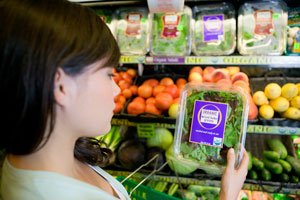Organic — now a staple in the marketplace
Kristen Bricko, Registered Dietitian
CentraCare Weight Management
 Staying health conscious — especially with a little one at home — is important. Not only that I provide my family with healthful food choices but also not put them in harm’s way from the hidden dangers that most conventionally grown foods contain. As a priority of mine, this is driving me to join millions of consumers in the growth of the organic food market. So, what is important to know? When should we splurge on organic and when is it safe to buy conventionally? And what about cost?
Staying health conscious — especially with a little one at home — is important. Not only that I provide my family with healthful food choices but also not put them in harm’s way from the hidden dangers that most conventionally grown foods contain. As a priority of mine, this is driving me to join millions of consumers in the growth of the organic food market. So, what is important to know? When should we splurge on organic and when is it safe to buy conventionally? And what about cost?
When people inquire about making lifestyle changes I always ask, “What is your health priority and is eating organically going to help you meet those goals? What is driving you to make a change? Are you a first-time parent concerned about your children’s health, a consumer who is interested in where your food comes from, how it is grown, and the safety of the environment/community, or a consumer who perceives organic foods to be healthier than conventionally grown or raised foods?
To start, what does it mean to be organic? The way food is grown will determine whether they may be classified as organic. Food must be grown without the use of synthetic pesticides, genetically modified organisms (GMOs) and fertilizers. Livestock must have access to the outdoors and be given organic feed — never given antibiotics, growth hormones or any animal by-products. The known fact for produce is those hidden chemicals are meant to kill pests, microbes, fungi, insects, etc. The pesticide residue on food is what consumers are ingesting, most commonly with fresh produce and are exposed to toxins through livestock with a diet that mainly consists of non-organic, GMO feed and growth hormones for faster growth. These toxins and compounds are controversial on how and if there is a significant impact to human health, so it then comes down to consumers buying choice and preference.
The unfortunate piece about making the transition to organic eating is it comes at a higher cost. Organic farming is more labor intensive, and there is a higher cost to be certified as well as buying organic feed for animals, thus leading to a pricier grocery bill. And sometimes, financially this just does not fit the budget. Consumers still can live a healthy lifestyle and obtain all their daily nutrition through conventionally grown and raised foods, but if buying organic is still something of great importance there are certain techniques, such as buying foods at a farmers market, joining a food co-op or taking advantage of a community supported agriculture (CSA) farm, to cut down on cost.
It is recommended to buy organic for the foods consumed daily as well as those indicated on the Environmental Working Group (EWG) "dirty dozen" list. Foods that are not worth the splurge and have lower pesticide levels — therefore deemed safer for consumption — you can find on the EWG’s clean 15 list.
Foods that are highest in pesticide levels include: apples, bell peppers, cucumbers, celery, potatoes, grapes, cherry tomatoes, kale, summer squash, nectarines, peaches, spinach, strawberries and hot peppers. These are foods that are best to be purchased organically when able.
Foods that are lower in pesticide levels include: asparagus, avocado, mushrooms, cabbage, sweet corn, eggplant, kiwi, mango, onion, papaya, pineapple, sweet peas, sweet potatoes, grapefruit and cantaloupe.
Buying organic does have its benefits, but buying conventionally raised or grown food still will allow for a healthy lifestyle. Eating organic does tend to be a bit controversial. It will ultimately come down to what is most important to you as a consumer and the goals that you would like to achieve.